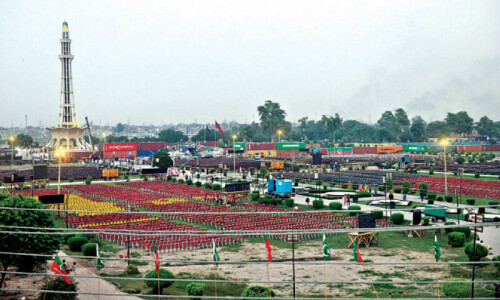PESHAWAR: Jamat-ud-Dawa (JuD) chief Hafiz Mohammad Saeed on Sunday accused the US and the ‘Jewish lobby’ of portraying the ongoing crisis in Yemen as a conflict between two major religious schools of thoughts.
“The war in Yemen is neither a Shia-Sunni dispute nor a conflict between Iran and Saudi Arabia. In fact the US and Jewish lobby are trying to depict the conflict a war between two sectarian groups,” he said while speaking at a ‘Pasban Harmain Sharifain Conference’ here on Sunday.
Leaders of ruling Pakistan Tehreek-i-Insaf, Jamaat-i-Islami, Pakistan Muslim League-N and other religious groups also addressed the gathering.
The JuD organised the event to drum up support for Saudi Arabia which is leading an air assault to crush the uprising in Yemen led by the Houthi rebels.
Without naming Iran, Hafiz Saeed said that a regional power, which was dubbing the US a ‘Great Satan’ and calling for the liberation of Baitul Maqdis from Israel, ‘was going to sign a nuclear treaty with it’. He said that ulema could play major role in educating people about what he said the new game plan in the Middle East.
“We urge this regional power to stay away from making friendship with the US and become part of the Ummah,” he said, and alleged that America and its allies were hatching conspiracies to encircle Kingdom of Saudi Arabia and start proxy war there.
Mr Saeed stated that private militias had been created in Lebanon, Iraq, Syria and Yemen to incite civil war in the Middle East.
The JuD chief alleged that Pentagon had chalked out a strategy to destabilise Muslim world by creating militias in Arab countries.
Hafiz Saeed justified the Saudi-led military action against Houthi rebels in Yemen and said that Abdul Malik, who was leading uprising in Yemen, had “announced that Mecca and Medina were their targets”.
Mr Saeed argued that a legitimate government in Yemen was overthrown and its president had sought help from Saudi Arabia.
He criticised the parliament for passing a resolution opposing deployment of Pakistani troops in Yemen.
On the occasion, Maqsood Salafi, leader of Ahle Hadith (Ehsan Elahi Zaheer group) vowed that volunteers were ready to go to Saudi Arabia to protect the holy places. He alleged that a country in the Middle East was trying to weaken Saudi Arabia with the support of America, in a reference to Iran.
Mr Salafi criticised the parliament and the government for ignoring the request of Saudi Arabia for military support against Houthi rebels. He claimed that joint resolution of the parliament had divided the nation.
Professor Ibrahim of Jamaat-i-Islami said that protection of holy places was part of the faith of every Muslim. He asked the government to ‘abandon policy of appeasement’ and openly give full military support to Saudi Arabia.
Published in Dawn, April 20th, 2015
On a mobile phone? Get the Dawn Mobile App: Apple Store | Google Play















































